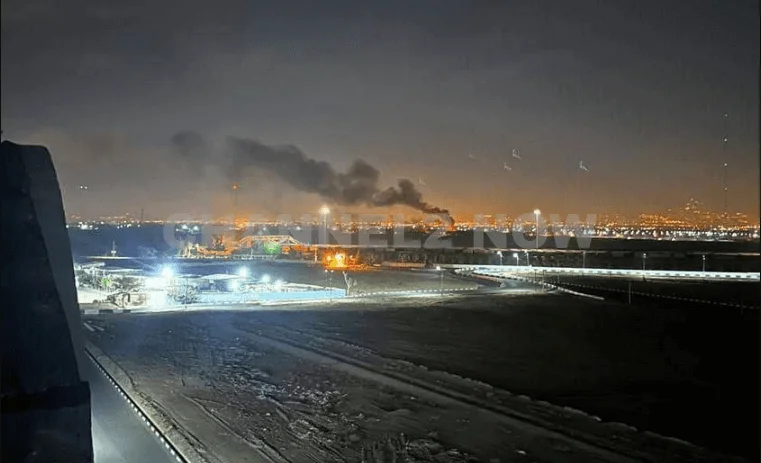
WorldIsrael conducted air strikes in Iran. Explosive Developments: Israel’s Air Strikes in Iran Shake Tehran as Residents Report Multiple Loud Explosions Amid Heightened Tensions and Fear of Retaliation from Iranian Revolutionary Guards
Explosive Developments: Israel’s Air Strikes in Iran Shake Tehran as Residents Report Multiple Loud Explosions Amid Heightened Tensions and Fear of Retaliation from Iranian Revolutionary Guards
On October 25, 2024, the geopolitical landscape in the Middle East was significantly impacted by Israel’s air strikes in Iran, sending shockwaves through the region and heightening fears of escalation between the two nations. Early Saturday morning, residents in Tehran reported hearing a series of loud explosions that rattled the city, intensifying concerns about the ongoing tensions and the potential for a broader conflict. While the cause of the explosions remains unclear, local sources, including several Iranian journalists, indicated that the detonations originated from the western side of Tehran, where the Iranian Revolutionary Guards maintain a prominent headquarters.
The sound of the explosions created an atmosphere of panic and uncertainty among the residents of Tehran, who have grown accustomed to the strains of conflict in the region. As people rushed to their windows and doorways, the fear of potential retaliatory strikes from Israel loomed large, casting a shadow over the city. The Israeli military has long been engaged in a complex and multifaceted strategy to counter perceived threats from Iranian forces and their allies in the region, leading to a heightened state of alert in Tehran and beyond.
In the aftermath of the explosions, social media platforms erupted with discussions and speculations about the implications of this military action. Many analysts pointed to the strategic importance of the Revolutionary Guards, noting that targeting their headquarters could signal a significant shift in Israel’s approach to Iranian operations in the region. The Revolutionary Guards have been integral to Iran’s military strategy, serving as a key component of its influence in Iraq, Syria, and Lebanon, among other areas.
As news of the explosions spread, both Israeli and Iranian officials remained largely silent, leaving the public to speculate about the motivations behind the air strikes. The Israeli government has consistently expressed its commitment to preventing Iran from obtaining nuclear capabilities, viewing the Iranian nuclear program as an existential threat. Recent diplomatic efforts aimed at curbing Iran’s nuclear ambitions have seen limited success, leading to increased tensions and military posturing from both sides.
The situation in Tehran is further complicated by the broader geopolitical context, as regional dynamics continue to shift in response to ongoing conflicts and alliances. The Syrian civil war, the rise of militant groups, and shifting U.S. foreign policy have all contributed to the increasingly volatile environment in the region. Iran’s support for proxy groups, including Hezbollah in Lebanon and various factions in Iraq and Syria, has drawn significant attention from Israel, which remains vigilant against what it perceives as encroaching threats to its security.
Residents of Tehran, meanwhile, grapple with the implications of living in a city that is at the epicenter of these geopolitical struggles. Reports of heightened military activity and preparations for possible retaliation by the Iranian government have left many feeling anxious and uncertain about the future. The psychological toll of living under the shadow of conflict can be profound, as families attempt to maintain a sense of normalcy amid the chaos.
In the wake of the explosions, public reactions have varied widely. Some citizens expressed anger at the Iranian government for its perceived failures to protect the country from foreign threats, while others called for unity in the face of external aggression. The Iranian leadership has often framed its conflict with Israel as part of a broader struggle against imperialism, using nationalist rhetoric to galvanize support among the populace.
The international community is closely monitoring the situation, with calls for restraint and dialogue growing louder in the aftermath of the air strikes. Diplomatic efforts aimed at de-escalation have become increasingly urgent, as many fear that further military actions could lead to a full-scale conflict with devastating consequences for the region and beyond. The United Nations and various nations have urged both Israel and Iran to exercise caution and prioritize diplomatic solutions to their differences.
As the day unfolded in Tehran, the echoes of the explosions continued to resonate throughout the city. Many residents remained on edge, unsure of what the future holds. The psychological impact of living in a conflict zone is not easily quantified, and the ongoing tensions serve as a reminder of the fragility of peace in the region. In the coming days, as the dust settles and the extent of the damage is assessed, the world will be watching closely to see how both Israel and Iran respond to this latest escalation.
In conclusion, the air strikes in Iran mark a significant escalation in the ongoing conflict between Israel and Iran, highlighting the intricate web of geopolitical tensions that define the region. As the situation develops, the potential for further military action remains a pressing concern, with ramifications that could extend far beyond the borders of Iran and Israel. The residents of Tehran, caught in the crossfire of this complex struggle, continue to navigate the challenges of living in a city marked by conflict, uncertainty, and fear.


